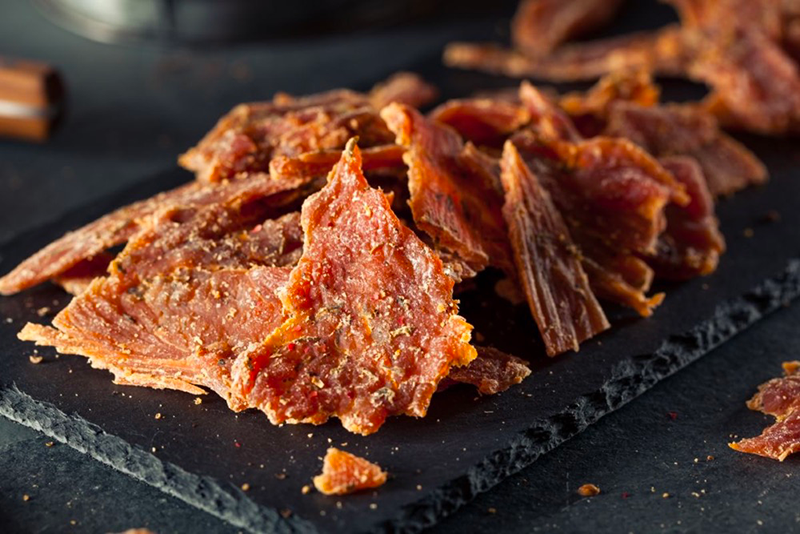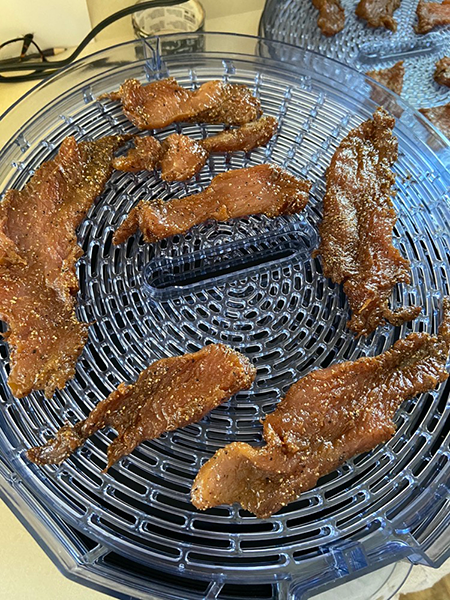
Content Menu
● Why Choose Turkey for Jerky?
>> Health Benefits of Turkey Jerky
● Essential Equipment
● Ingredients
>> Simple Marinade Recipe
● Step-by-Step Process
>> Step 1: Prepare the Turkey
>>> Tips for Slicing
>> Step 2: Marinate the Turkey
>>> Marination Time
>> Step 3: Prepare the Dehydrator
>> Step 4: Dehydrate
>>> Testing for Doneness
>> Step 5: Post-Drying Heating (Optional)
● Storing Your Jerky
>> Storage Tips
● Flavor Variations
● Common Mistakes to Avoid
● Conclusion
● FAQ
>> 1. How long does it take to dehydrate turkey jerky?
>> 2. Can I use other meats besides turkey?
>> 3. How do I know when my jerky is done?
>> 4. Is homemade turkey jerky healthier than store-bought?
>> 5. How should I store my turkey jerky?
● Citations:
Making turkey jerky at home is a rewarding and delicious project that allows you to create a healthy snack packed with protein. Using a food dehydrator is one of the best methods for achieving perfectly dried jerky, as it provides consistent heat and airflow. In this guide, we will walk you through the steps of making turkey jerky, from selecting the right meat to the final drying process.

Why Choose Turkey for Jerky?
Turkey is an excellent choice for jerky due to its lean nature and high protein content. Unlike beef, turkey has lower fat levels, making it a healthier alternative for those looking to reduce their calorie intake while still enjoying flavorful snacks.
Health Benefits of Turkey Jerky
- Lean Protein: Turkey jerky is a healthy source of lean protein. With upwards of 10 grams of protein per serving, it serves as a great pre or post-gym snack.
- Low in Saturated Fat: It contains significantly less saturated fat compared to other meats, making it a heart-healthy option.
- Low Calorie: With only about 100 calories per serving, turkey jerky is perfect for those watching their weight.
- Nutrient Dense: It provides essential nutrients such as iron and zinc, which are vital for immune function and overall health[5][10].
Essential Equipment
To make turkey jerky, you will need:
- Food Dehydrator: A reliable dehydrator is crucial for even drying. Popular brands include Excalibur and Nesco.
- Sharp Knife or Meat Slicer: For cutting the turkey into uniform strips.
- Mixing Bowl: For marinating the turkey.
- Airtight Containers: For storing the finished jerky.
Ingredients
Here's what you'll need:
- 1 to 1.5 pounds of turkey breast or tenderloin
- Marinade ingredients (see below)
Simple Marinade Recipe
- 2 tablespoons soy sauce
- 1 tablespoon Worcestershire sauce
- 1 tablespoon brown sugar
- 1 teaspoon garlic powder
- 1 teaspoon onion powder
- ½ teaspoon black pepper
- Optional: liquid smoke for added flavor
Step-by-Step Process
Step 1: Prepare the Turkey
Start by trimming any visible fat from the turkey breast. Then, slice the turkey into thin strips, about $$ \frac{1}{4} $$ inch thick. Uniform slices ensure even drying, which is essential for achieving the perfect texture.
Tips for Slicing
Using a sharp knife is crucial when slicing turkey for jerky. A dull knife can lead to uneven cuts and make the process more difficult. If you have never sharpened a knife before, it's worth learning how as it can greatly enhance your cooking experience[1].
Step 2: Marinate the Turkey
In a mixing bowl, combine all marinade ingredients. Add the sliced turkey and ensure each piece is well-coated. Cover and refrigerate for at least 4 hours, but overnight is best for maximum flavor absorption.
Marination Time
Marinating your turkey for an extended period allows the flavors to penetrate deeply into the meat. Most experts recommend marinating between 12 to 24 hours for optimal taste[6].
Step 3: Prepare the Dehydrator
After marinating, remove the turkey from the fridge and let it drain in a colander to remove excess marinade. Arrange the strips on dehydrator trays in a single layer, ensuring they do not touch each other to allow proper airflow.

Step 4: Dehydrate
Set your dehydrator to 160°F (70°C) and let it run for about 4 to 6 hours. The exact time may vary based on the thickness of your slices and your specific dehydrator model. Start checking around the $$3$$-hour mark.
Testing for Doneness
- Bend Test: The jerky should bend without breaking completely.
- Rip Test: When ripped apart, it should show white fibers inside but not be overly dry or crumbly.
Step 5: Post-Drying Heating (Optional)
To ensure food safety, especially if you're unsure whether your dehydrator reaches an internal temperature of $$165°F$$, consider heating your jerky in an oven at $$275°F$$ for $$10$$ minutes after dehydrating[7]. This step kills any potential pathogens that may be present.
Storing Your Jerky
Once your turkey jerky is fully dried, let it cool completely before storing it in airtight containers or resealable bags. Properly stored jerky can last up to two weeks at room temperature or longer if refrigerated.
Storage Tips
- Cool & Dry Environment: Keep your jerky in a cool, dry place away from direct sunlight.
- Vacuum Sealing: For long-term storage, consider vacuum sealing your jerky to prevent air exposure and moisture[9].
Flavor Variations
One of the great things about making turkey jerky at home is that you can customize flavors according to your preferences. Here are some popular variations:
- Spicy Teriyaki: Add teriyaki sauce with additional cayenne pepper or sriracha for heat.
- Honey Mustard: Mix honey with mustard and soy sauce for a sweet-tangy flavor.
- BBQ Style: Incorporate BBQ sauce into your marinade for a smoky flavor profile.
Common Mistakes to Avoid
When making turkey jerky, there are several common pitfalls that can affect the quality of your final product:
- Skipping Trimming: Even if you select a lean cut of meat, failing to trim visible fat can lead to spoilage and uneven drying[6].
- Incorrect Slicing: Ensure uniformity in thickness when slicing; pieces that are too thick will take longer to dry while thinner ones may become brittle[1].
- Not Marinating Long Enough: Rushing through marination can result in bland jerky; allow enough time for flavors to develop[6].
Conclusion
Making turkey jerky in a food dehydrator is a straightforward process that results in a delicious and nutritious snack. With just a few simple ingredients and steps, you can create homemade jerky that rivals store-bought versions. Enjoy your turkey jerky as a protein-packed snack during hikes, road trips, or simply as a tasty treat at home!

FAQ
1. How long does it take to dehydrate turkey jerky?
Typically, it takes about $$4$$ to $$6$$ hours at $$160°F$$ (70°C) in a dehydrator, but this can vary based on thickness and moisture content.
2. Can I use other meats besides turkey?
Yes! You can use chicken, beef, or even game meats like venison with similar marinating and drying techniques.
3. How do I know when my jerky is done?
The jerky should bend without breaking completely; if it cracks too much or breaks apart easily when bent, it may be over-dried.
4. Is homemade turkey jerky healthier than store-bought?
Generally, yes! Homemade jerky allows you to control ingredients like salt and sugar levels, making it a healthier option.
5. How should I store my turkey jerky?
Store your jerky in airtight containers or resealable bags in a cool place away from direct sunlight. Refrigeration can extend its shelf life significantly.
Citations:
[1] https://www.jerkyholic.com/turkey-jerky/
[2] https://www.youtube.com/watch?v=N5mSkbdfByQ
[3] https://community.legendarywhitetails.com/blog/how-to-make-some-dang-good-wild-turkey-jerky/
[4] https://mountainamericajerky.com/how-to-store-your-jerky-for-peak-flavor-and-freshness/
[5] https://mountainamericajerky.com/turkey-jerky-healthy/
[6] https://www.chowhound.com/1717253/mistakes-avoid-cooking-beef-jerky/
[7] https://www.backcountrypaleo.com/gobble-up-some-turkey-jerky/
[8] https://www.traeger.com/recipes/smoked-turkey-jerky
[9] https://smokedmeats.com/blogs/news/does-turkey-jerky-go-bad
[10] https://www.leesmarketjerky.com/blogs/blog/beef-vs-turkey-which-jerky-is-healthier-for-you











